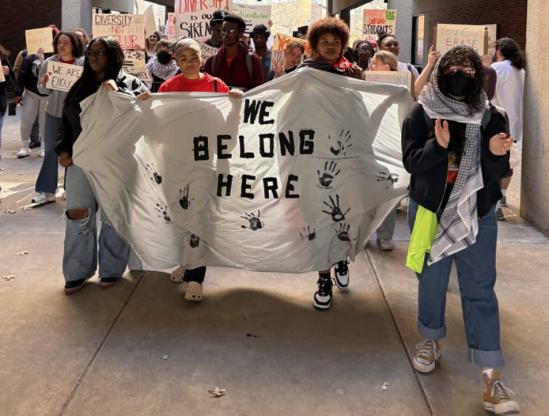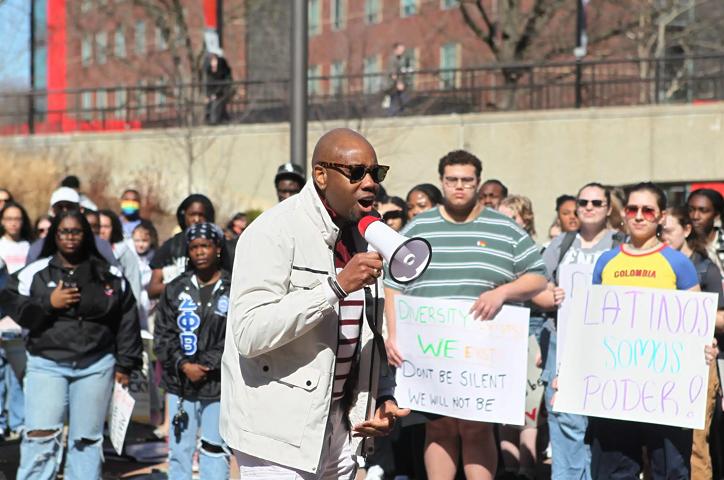There is a common consensus among minority students at the University of Louisville (at least those involved in politics) that our greatest enemy is House Bill 4 and the changes it brought.
But to Dr. Ricky L. Jones, House Bill 4 only acted as a gateway for universities that already didn’t really care if Black students attended them to hide their actions behind “government mandates.”
Jones first joined the University of Louisville as a staff member in 1996. While he is currently a professor in the Pan-African Studies department, he previously served as its chair for 10 years.
Before his time spent with UofL, he received his bachelor’s degree in political science at Morehead College and was the second African American man to receive his Ph.D. in political science at the University of Kentucky.
According to him, a hostile white university is “Not in the best interest of Black people. One that ignores their interests largely, gaslights them, and silences them by putting bureaucratic structures in place while consistently telling people that they have their best interests at heart, but they don’t.
It’s one that consistently gives out misinformation or no information regarding Black folk.”
“One of the most insidious ways that is happening at the University of Louisville right now is just utter silence around issues of importance. And they’ve accomplished that in numerous ways.”
That is what he believes to be currently happening at the University of Louisville. He states that both the Black leadership and the diversity, equity, and inclusion initiatives at the school have become watered down, and that Trump’s presidency isn’t all to blame for it either.
“I don’t want to use anti-DEI because that’s a loaded term. They demonize that as a catch-off, but they’re pushing anti-diversity [legislation], which is really anti-Black legislation,” he said.

“And if you look at the legislative record, they were pushing these things before Trump was reelected. So, this is not all about Donald Trump. You’ve got Republican legislators that were trying to do this in Kentucky, and certainly in other places too.” Previous efforts to rollback funding for “DEI initiatives” occurred in March 2025 when the Kentucky House voted to defund DEI offices at public universities, following in the footsteps of more than 30 other states at the time who alsointroduced anti-DEI policies. U of L students march with a banner that reads, “WE BELONG HERE,” Feb. 28, 2025. More than 200 students gathered to protest House Bill 4 aimed to rollback diversity, equity and inclusion initiatives on Kentucky college campuses. (Photo by Brennan Allen) But Jones doesn’t see our Republican super majority government to be the only one to blame for pushing what he refers to as “anti-diversity” and “anti-Black” legislation. “We’ve always had a relatively low representation of Black students at the University of Louisville since it was integrated in 1950 and a relatively low representation of Black faculty, even though the folk in Frankfort are making the argument that somehow Black students and faculty staff are getting these extra benefits and extra considerations because of race,” he said. “The administration (UofL’s board of trustees and presidents’ office) is doing nothing to refute that argument, and initiatives that have been put in place to help grow the population of Black students and faculty are now being attacked and abandoned. That makes things hostile.” When asked his opinion on the threat of public universities losing their federal funding if they didn’t comply with House Bill 4, he said that he believes it was a “cowardly stance.”
“Everything that Hitler did in Germany was legal,” said Jones. “How do we look at the Germans who bowed to that? Like cowards and some war criminals. Even if you had to comply, I personally would have felt better if the current president of the University of Louisville stood up like a leader and said; Look, we’re gonna comply because we have to, because we’re backed into a corner. Not because we agree.” Jones also criticizes other Black UofL staff members for their heavy compliance with the university’s anti-diversity initiatives, and their reluctance to talk to students about the issue. When asked for a statement on the impact of House Bill 4 on Louisville’s campus, one Center for Belonging, Access and Engagement staff member stated, “We can’t speak on that.”
“I say shame on Black faculty, shame on Black staff who choose to stay silent,” Jones said. “We’re here because there were Black people who chose not to stay silent. We’re here because of people like Yvonne Jones, Joseph McMillan, Blaine Hudson, many Black faculty and staff members who are dead or retired or on the brink of retirement, who really fought like dogs to have Black presence and a modicum of Black influence and advocacy on this campus.”
“To take their work and just abandon it by cowering and making excuses […] shame on them,” said Jones. “The biggest hit here lately was not HB4. It was the systematic longitudinal erosion of strong Black leadership.” Jones only sees the university’s Black presence becoming less prominent and acknowledged in the years to come, due to both the lack of willpower and knowledge. “I think it’s going to get worse because we just don’t have people who are willing to fight. On any level. At this point, they’re not even paying attention. It’s amazing how many Black students ain’t even aware now. They walk around just oblivious to things.”
“There’s no campus infrastructure. You ain’t gonna get aware by going over to the Cultural Center. Their leadership is not such that it’s going to make you aware and encourage you to do anything. You know, they just want to feed you some hot dogs every now and then and chicken wings or whatever, and go on about your business.” To the current and future Black students of UofL, Jones only has two things to say. “You’re in trouble. Black people are under attack here. Black leadership here is terrible. It does not have the heart to truly fight for you in the way that you need to be fought for,” said Jones. “Lastly, for I don’t know how long it’ll still be around, do your best while you have the opportunity to take Pan-African studies classes. And I’m not saying that because I am a Pan African studies professor. I’m saying it because that is the only place that you are going to be able to learn about yourself.”
















